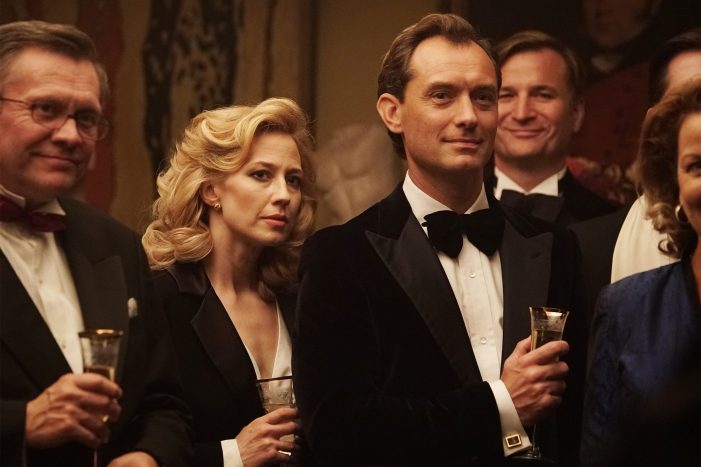Life is good for Rory (Jude Law). He has a good job in the United States where he shares a comfortable home with his wife, son and step-daughter. But he’s unhappy and feels his career may be stagnating. Sensing an opportunity back in London he moves the entire family back to England and starts to spend money on all the accoutrement of a well to do individual. But his finances aren’t coming together as easily as he thought, and his family are beginning to feel the strain.
Rory is an archetypal Yuppie (Young, Upwardly Mobile Professional). It’s a phrase that was very popular in the 80s but fell out of fashion, though is still as relevant as it ever was. It’s a derogatory term implying a false front of success covering a lack of morality and inherent cheapness. The term was both a classist dig at the nouveau riche by the established ruling classes and a slur against working class people perceived to have sold out or lost track of their roots. Rory experiences both. He does himself no favours with his new rich colleagues and clients by laying on his pretentions too thick, but he’s also utterly detached from his roots. This is the dark, pathetic heart of a Del Boy type.

Jude Law is compellingly horrific in this role. He’s a tightly wound spring ready to snap at the smallest setback. He plays the role with an impatience and resentment that makes the character unpredictable, frightening and very compelling. Carrie Coon’s Allison however is not going to be the conventional long-suffering housewife character, or a quiet enabler of his bullshit. She is stoic but very much her own person who riles against Law’s artifice at all turns. The best scenes of the film are when the tension between the two erupts into fast paced dramatic arguments.
There’s a heavy foreboding atmosphere in The Nest. Sequences set within Rory’s newly acquired crumbling Victorian farmhouse resemble a horror film. The stagnant home is bereft of energy or warmth and seems incapable of nurturing life or happiness. It’s a not-too-subtle manifestation of the archaic and ultimately baron standards of success that Rory is trying to secure for his family.

In spite of the enigmatic atmosphere, The Nest is a little overt in it’s intentions and messages. Dialogue is available to explain away all of the hollowness and frustration Rory is experiencing and how his troubled childhood fuels it all. With such accomplished direction and beautifully foreboding atmosphere, it would have been more satisfying had the frustrations remain unspoken.
As character exploration, The Nest is a fantastic insight into a very toxic aspect of masculine identity. The high pressure nature of the 80s borne (but very much contemporarily relevant) modern breadwinner is menacingly made vivid here. It might be a bit too on the nose, but it still a resonant interrogation of the troubling expectations we place upon ourselves.
Four Stars
